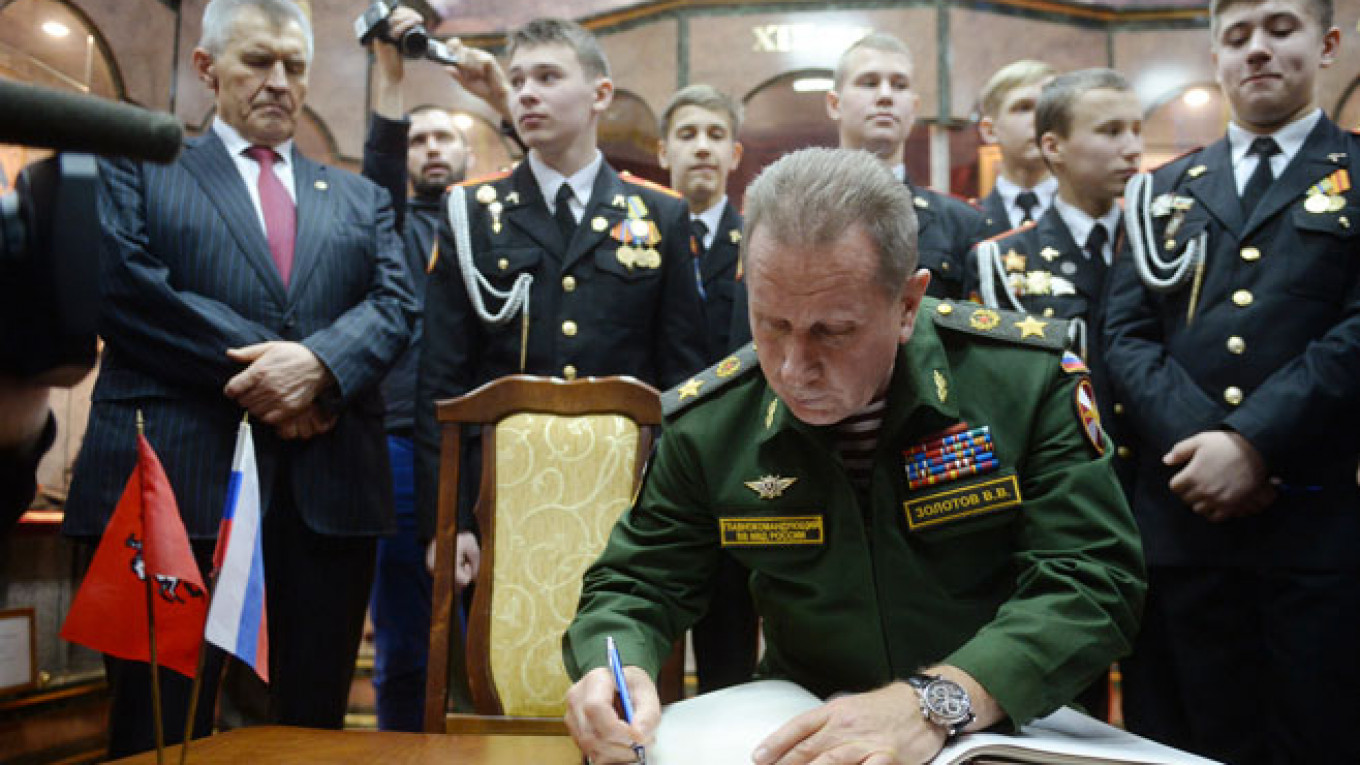
Nikolai Petrov
As is often the case in Russia, the creation of the National Guard was long anticipated, and therefore, caught everyone by surprise.
The sheer scale of the restructuring has affected practically every branch of the siloviki. The Interior Ministry will lose most of its muscle: 170,000 interior troops, 50,000 special forces and riot police, private security forces as well as control over private security forces and arms trafficking will all go to the National Guard.
In exchange, the Interior Ministry will receive 30,000 Federal Drug Control Service (FSKN) personnel — without generals — and approximately the same number of staff from the Federal Migration Service (FMS). Both services have essentially been disbanded and their directors marginalized.
Both Viktor Ivanov — former FDCS head and chief personnel officer for President Vladimir Putin — and Konstantin Romodanovsky — former FMS head, Chekist and major player in the Interior Ministry — are out of the picture.
In their place, Viktor Zolotov, who has been guarding Putin since the mid-1990s, has taken center stage. He will head a force that stands somewhere between a super-sized government agency and a 400,000-strong intelligence service.
Observers are already explaining that Putin instituted this unprecedented reform as preparation for suppressing the mass protests that will inevitably break out as the socio-economic situation in the country continues to decline.
This is partially true, and for that reason the authorities have been steadily adding to the ranks of various riot police and rapid deployment forces.
But even more important is the way this reform has changed the balance of power among the Russian elite.
In fact, that balance has shifted significantly over the past two years, generally investing more power in the siloviki — particularly the FSB, army and Chechen leader Ramzan Kadyrov, who heads what is essentially a separate siloviki structure in its own right.
Now the all-powerful Russian president will have a potent tool at his disposal that answers to no one but himself. It is a personal army unregulated as yet by any law. But this move also levels the balance of power within the siloviki, in much the same way as when Putin transformed the FDCS into a sort of second FSB in the mid-2000s. That put the two intelligence services into competition, making it possible for Putin to rely on either one as the situation demanded, playing each against the other.
Oil prices have fallen, and along with them, the strength of the central government. It is as if Russia has returned to the 1990s. And the rise of Viktor Zolotov bears striking parallels to the rise more than 20 years ago of Alexander Korzhakov, chief bodyguard to former-President Boris Yeltsin. When Yeltsin's popularity hit rock bottom, Korzhakov advocated canceling presidential elections. However, he ultimately lost out to former Deputy Prime Minister Anatoly Chubais and his group of reformers who argued that the election process should proceed.
While there is little need to cancel presidential elections in 2018, Zolotov remains positioned to keep guard over Putin's revanchist interests.
Thus, the big winners in the creation of the National Guard are Putin, Zolotov, whose influence has dramatically increased, and the entire presidential guard headed by Yevgeny Murov. The losers include all of the remaining siloviki: Interior Minister Vladimir Kolokoltsev, FSB chief Alexander Bortnikov and, to some degree, both Defense Minister Sergei Shoigu, Russia's most popular minister, and Kadyrov, who "owns" the most powerful special forces in the country.
Are the Russian people also among the losers? Definitely, inasmuch as this restructuring empowers the siloviki and Chekists, who now have a personal army in place of a hired army accountable to the public. Worse, an army must act: Putin's force base has expanded, raising the risk that police will use force not only to put down protests, but the political process in broader sense.
The increased competition between security forces will most likely add pressure to the business community. After all, the National Guard is the new "protector" in the racket game, and it will seek to obtain the protection money that businesses currently pay to other security forces.
But keep in mind that it is much easier to issue a presidential decree than to carry out restructuring. The scale of the changes Putin envisions is so great that they will take years to implement in a country the size of Russia. And that means the siloviki will have something to do now besides simply expanding their ranks — that is, creating a new hierarchy and clarifying the nature of their mutual relations.
Nikolai Petrov is a political analyst.
A Message from The Moscow Times:
Dear readers,
We are facing unprecedented challenges. Russia's Prosecutor General's Office has designated The Moscow Times as an "undesirable" organization, criminalizing our work and putting our staff at risk of prosecution. This follows our earlier unjust labeling as a "foreign agent."
These actions are direct attempts to silence independent journalism in Russia. The authorities claim our work "discredits the decisions of the Russian leadership." We see things differently: we strive to provide accurate, unbiased reporting on Russia.
We, the journalists of The Moscow Times, refuse to be silenced. But to continue our work, we need your help.
Your support, no matter how small, makes a world of difference. If you can, please support us monthly starting from just $2. It's quick to set up, and every contribution makes a significant impact.
By supporting The Moscow Times, you're defending open, independent journalism in the face of repression. Thank you for standing with us.
Remind me later.


